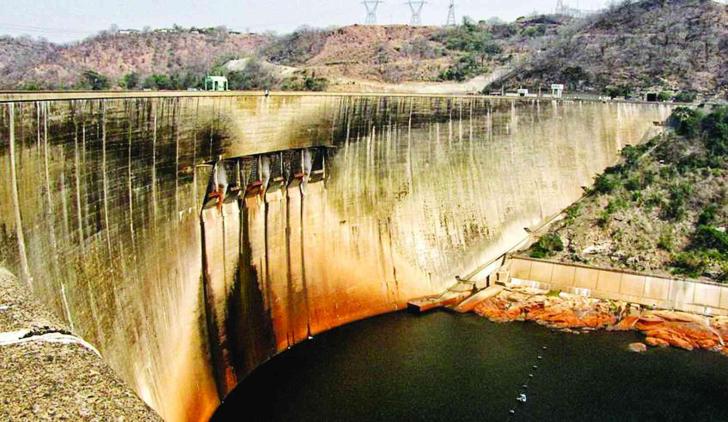News / National
Zimbabwe and Zambia combine efforts to solve their power woes
20 Nov 2024 at 07:09hrs |
23 Views

Zimbabwe and Zambia are combining efforts to deal with their electricity crises, which have seen power cuts of up to 21 hours per day.
With no load shedding for eight months, Eskom has asked South Africans to help fight illegal connections that overload transformers and to ensure their pre-paid meters are up to date, after years of pleading for a reduction in electricity use.
Zambia and Zimbabwe, on the other hand, have a dire lack of generation that they hope to solve with renewable sources.
Both countries rely heavily on the hydroelectric power station on the Kariba Dam, but thanks to El Nino, water levels have dropped too low for generation.
That has hit their economies hard.
"Far too many of our citizens, particularly in rural and underserved areas, still lack reliable energy," said Zimbabwean Vice President Constantino Chiwenga at a summit at Victoria Falls on Monday.
"This limited access means fewer economic opportunities, lower standards of living, and slower industrial growth," he said.
About 47% of Zambia has access to electricity overall, but in rural areas that drops to 12%. In Zimbabwe, overall grid access is at 62%, and in rural areas 37% of households are connected.
Chiwenga said the solution lay in renewable energy.
"Both Zimbabwe and Zambia enjoy abundant sunlight throughout the year. With the right investments, we can build large-scale solar farms that can generate power not only for local consumption but also for export to neighbouring countries through regional power pools like the Southern African Power Pool (SAPP)," he added.
The Zambezi River Authority (ZRA), which manages the Kariba Dam, said it had plans underway to have floating solar panels on the dam.
Zambian Energy Minister Makozo Chikote said his country's over-dependence on hydroelectricity had to be fixed.
This has derailed some of the country's economic targets, particularly in the mining industry. Zambia wants to produce three million metric tonnes of copper per year by 2035.
Therefore, focusing on smart technology and infrastructure remains critical.
Chikote said, "We are focusing on improving the efficiency and reliability of our energy infrastructure through targeted investments in grid modernisation, energy storage, and smart technologies.
"By upgrading our electricity transmission and distribution networks, we can minimize transmission losses, improve system reliability, and ensure a stable supply of electricity to industries and consumers across the country."
Zimbabwe and Zambia have coal reserves that could last for the next 300 years. However, both countries are prepared to move towards clean energy, provided they have support from the private sector and the developed economies.
With no load shedding for eight months, Eskom has asked South Africans to help fight illegal connections that overload transformers and to ensure their pre-paid meters are up to date, after years of pleading for a reduction in electricity use.
Zambia and Zimbabwe, on the other hand, have a dire lack of generation that they hope to solve with renewable sources.
Both countries rely heavily on the hydroelectric power station on the Kariba Dam, but thanks to El Nino, water levels have dropped too low for generation.
That has hit their economies hard.
"Far too many of our citizens, particularly in rural and underserved areas, still lack reliable energy," said Zimbabwean Vice President Constantino Chiwenga at a summit at Victoria Falls on Monday.
"This limited access means fewer economic opportunities, lower standards of living, and slower industrial growth," he said.
About 47% of Zambia has access to electricity overall, but in rural areas that drops to 12%. In Zimbabwe, overall grid access is at 62%, and in rural areas 37% of households are connected.
Chiwenga said the solution lay in renewable energy.
"Both Zimbabwe and Zambia enjoy abundant sunlight throughout the year. With the right investments, we can build large-scale solar farms that can generate power not only for local consumption but also for export to neighbouring countries through regional power pools like the Southern African Power Pool (SAPP)," he added.
The Zambezi River Authority (ZRA), which manages the Kariba Dam, said it had plans underway to have floating solar panels on the dam.
Zambian Energy Minister Makozo Chikote said his country's over-dependence on hydroelectricity had to be fixed.
This has derailed some of the country's economic targets, particularly in the mining industry. Zambia wants to produce three million metric tonnes of copper per year by 2035.
Therefore, focusing on smart technology and infrastructure remains critical.
Chikote said, "We are focusing on improving the efficiency and reliability of our energy infrastructure through targeted investments in grid modernisation, energy storage, and smart technologies.
"By upgrading our electricity transmission and distribution networks, we can minimize transmission losses, improve system reliability, and ensure a stable supply of electricity to industries and consumers across the country."
Zimbabwe and Zambia have coal reserves that could last for the next 300 years. However, both countries are prepared to move towards clean energy, provided they have support from the private sector and the developed economies.
Source - News24
Join the discussion
Loading comments…






























